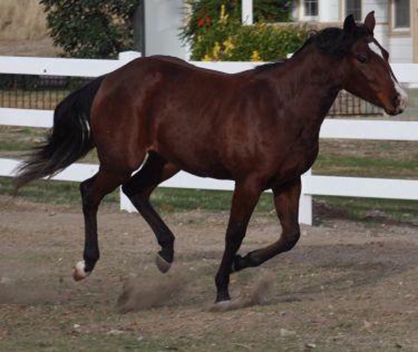AQHA Filly Undergoes Complicated Surgery at UC Davis
 UC Davis Veterinary Medicine
UC Davis Veterinary Medicine
Roses successfully underwent a complicated surgery at UC Davis to remove a cyst from her neck.
“Case of the Month” – December 2016
Roses, an American Quarter Horse yearling filly, was in need of surgical intervention to remove a retropharyngeal mass. The mass, known as a branchial remnant cyst, was a congenital abnormality arising from an embryonic structure called the third branchial arch. By the time Roses was 1 year old, the cyst had grown to the size of a softball and protruded from the right side of her throatlatch. It began to impede her movement, and she was unable to fully bend her neck and head to the right. The cyst was also compressing her trachea.
As the cyst was located adjacent to the carotid artery, jugular vein, esophagus and trachea (bringing high risk for complications associated with removal), many veterinarians were hesitant to attempt surgery. Owner Dana Jones had difficulty finding one that was enthusiastic to take on the task. That is, until she called the UC Davis veterinary hospital and spoke to Dr. Scott Katzman, a board-certified surgeon with the Equine Surgery and Lameness Service.
“Dr. Katzman called me back within a half hour, and we had a really great conversation about the pros and cons,” continued Jones. “I was amazed at his accessibility and his interest in taking this complicated case.”
Roses was soon transported to UC Davis where she was evaluated, and was determined to be a good candidate for anesthesia and surgery. Prior to surgery, she received antibiotics and nonsteroidal anti-inflammatory drugs (NSAIDs) to prevent infection and reduce inflammation associated with the procedure. The Anesthesia/Critical Patient Care Service and large animal technicians prepared Roses for surgery. A linear incision was made directly over the cyst, and the cyst was freed from the surrounding tissues using blunt and sharp dissection as well as an electrosurgical vessel and tissue sealing device. Dr. Katzman was then able to remove the cyst, and it was submitted for histopathology to confirm the clinical diagnosis of branchial remnant cyst.
Roses recovered well from surgery and additional NSAIDs, and systemic antibiotics were continued for one week postoperatively. Roses was hospitalized for a further six days and closely monitored for signs of upper airway obstruction, dysphagia, and excessive swelling at the surgical site as well as for any signs of systemic illness before returning home.
“I was absolutely blown away by the quality of care at UC Davis,” said Jones. “It exceeded my expectations in every way.”
Jones is now hopeful that Roses can begin her career in reined cow horse competition. She’s scheduled to start in her two-year-old year this coming spring.
“We’re now going to invest some time and energy into finishing Roses (into a competition horse),” said Jones. “She’s a very nicely bred horse.”
In reined cow horse competition, horses work a cow in an arena and must show proficiency in reining events, in herd work (or cutting events), and fence work (controlling a cow on the fence).
Roses’ brother competed in the National Reined Cow Horse Association Snaffle Bit Futurity – one of the most prestigious events in the Western performance industry. Jones feels Roses has the pedigree to follow in his footsteps now, thanks to the expert care she received at UC Davis.
“UC Davis has great service and, frankly, a lot of guts for taking on this surgery,” Jones proclaimed. “Everybody that worked with me was great. I never once felt that I wasn’t included in the process. I’ve had horses all my life so I wanted to be part of it. Their team kept me involved the entire time, and that meant a lot to me.”










